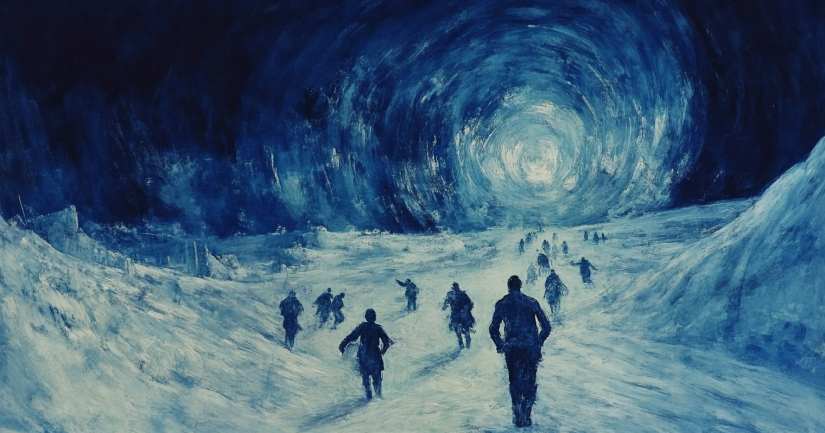
Dive into the narrative’s stark truths with Night Chapter 6 Quiz, exploring its emotional and thematic depths. This chapter plunges you deeper into the harrowing journey of survival and resilience. As you engage with the questions, you’ll unravel the profound themes of endurance and faith. Wiesel’s vivid portrayal of a death march through snow and despair offers a gripping backdrop for reflection.
In this quiz, each question will challenge your understanding of the text’s emotional and moral depth. You’ll explore the intense bond between Wiesel and his father, a relationship strained yet strengthened by the horrors they face. Consider the chilling silence of the night, where hope flickers like a distant star.
The death march begins can you follow the events that unfold? Keep going with Night Chapter 7 Quiz. If you need to revisit the earlier suffering, go back to Night Chapter 5 Quiz. And when you’re ready, challenge yourself with Night Full Book Quiz!
As you progress, you’ll gain insights into the human spirit’s capacity to endure unimaginable trials. The quiz encourages you to reflect on the stark realities of suffering and the glimmers of hope that persist. Test your knowledge, and immerse yourself in the powerful narrative of Night. Join us on this journey, where every question leads to a deeper comprehension of Wiesel’s unforgettable story. Night by Elie Wiesel Quizzes: Examine the powerful themes of survival and loss …
What Happened – Night Chapter 6
The prisoners were forced to run through the snow. They had to cover a long distance quickly. Many prisoners fell and were trampled. Eliezer and his father stayed together. They encouraged each other to keep moving.
They ran for hours without stopping. The SS guards shouted at them to go faster. Some prisoners gave up and were shot. Others died from exhaustion. Eliezer felt his foot was hurting, but he kept going.
After running, they reached an abandoned village. The prisoners were allowed to rest in a crowded shed. Eliezer and his father found a spot to sit. They were very tired and cold. Eliezer thought about sleeping, but he knew it was dangerous. Sleeping in the cold could lead to death.
Eliezer and his father took turns keeping each other awake. They saw Rabbi Eliahu looking for his son. His son had abandoned him during the run. Eliezer hoped he would never do that to his own father.
After some rest, the prisoners were forced to march again. They arrived at the Gleiwitz camp. The camp was overcrowded. The prisoners were pushed into a barrack. They struggled to breathe in the cramped space.
Eliezer found himself on top of a pile of bodies. He realized Juliek, a musician, was beneath him. Juliek played his violin before he died. The next day, Eliezer saw Juliek’s broken violin. The prisoners stayed in Gleiwitz for three days without food or water. Then, they prepared for another journey.
Night Chapter 6 – Quotes
- “I’m not afraid. I shall not be afraid.” – Eliezer, ‘Eliezer motivates himself to endure the march despite the overwhelming fear and exhaustion.’
“Why don’t they shoot us right away?” – Fellow Prisoner, ‘A fellow prisoner’s despairing question during the brutal forced march through snow and cold.’
“Death enveloped me, it suffocated me.” – Eliezer, ‘Eliezer’s reflection on the overwhelming presence of death during the march.’
“We were masters of nature, masters of the world. We had forgotten everything—death, fatigue, our natural needs.” – Eliezer, ‘A moment of defiance and unity among the prisoners as they march onward.’
“Faster, you filthy dogs!” – SS Officer, ‘The SS officer’s cruel command urging the exhausted prisoners to move faster during the march.’
“His eyes were full of terror.” – Eliezer, ‘Eliezer observes the fear in another prisoner’s eyes, symbolizing the pervasive dread among them.’
“The officer wielded his club and dealt him a violent blow to the head.” – Eliezer, ‘An example of the brutal treatment the prisoners faced from the guards during the march.’
“I was thinking of my father. He must have suffered more than I did.” – Eliezer, ‘Eliezer’s concern for his father’s well-being amidst the harsh conditions of the march.’
Night Chapter 6 – FAQ
Chapter 6 of Night is centered around the relentless struggle for survival. The characters endure harsh conditions during a forced march in the snow, highlighting themes of endurance, despair, and the will to live despite overwhelming odds.
In this chapter, Eliezer’s relationship with his father becomes even more vital. As they endure the brutal march, their bond deepens, with Eliezer feeling a profound sense of responsibility to keep his father alive, illustrating the theme of familial loyalty amidst chaos.
During the forced march, prisoners face exhaustion and death in freezing conditions. Many fall and perish, unable to continue. The march is a harrowing test of physical and mental endurance, with the looming threat of death for those who cannot keep pace.
The author employs vivid imagery to depict the prisoners’ suffering. Descriptions of the biting cold, the relentless snow, and the despair etched on the prisoners’ faces create a visceral sense of their agony, immersing readers in the harrowing reality of their journey.
In Chapter 6, hope flickers faintly yet persistently. Despite the dire circumstances, some prisoners cling to memories and dreams of liberation. This hope, however fragile, provides a sliver of motivation to endure the seemingly unendurable, underscoring the human spirit’s resilience
